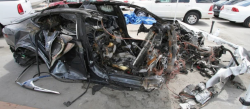
— A Florida Tesla Model S crash that killed 18-year-old Barrett Riley was primarily the fault of the teen and his father, according to a jury which found Tesla only 1% at fault.
Tesla was sued by Riley's father who claimed several defects were responsible for the high-speed crash that killed his son Barrett.
The lawsuit argued the Model S accelerated to a high rate of speed and lost control, traveling over a curb and sideswiping a wall before the car crashed into a different wall. The car went back onto the road and hit a curb and a metal pole.
According to the lawsuit, Barrett would have survived the crash if the allegedly defective battery hadn't exploded into flames.
The National Transportation Safety Board (NTSB) investigated the crash and determined Tesla Model S driver Barrett Riley and his front seat passenger Edgar Monserratt Martinez were killed because Riley was driving 116 mph on a 25 mph curve.
The NTSB said the resulting electric vehicle battery fire contributed to the deaths.
Barrett Riley was cited for driving 112 mph in a 50 mph speed zone in March 2018, so his father asked Tesla to limit the speed of the car. Tesla placed the Model S into loaner mode which limited the speed to 85 mph.
The younger Riley later took the Tesla for service and asked technicians to remove the loaner mode which removed the speed limiter.
Tesla argued the crash wouldn't have occurred if Riley wouldn't have been driving at such a high speed in a 25 mph zone, and his parents shouldn't have allowed him to continue driving based on his history of speeding and reckless driving.
The jury found Tesla 1% negligent and Barrett Riley 90% negligent, while the jury ruled his father James Riley was 9% negligent.
Even though Tesla was found only 1% at fault, the jury recommended an award of about $10 million to Riley's family. However, Tesla likely won't be held to that amount based on only 1% responsibility.
The case is James B. Riley, v. Tesla, Inc, et al.




